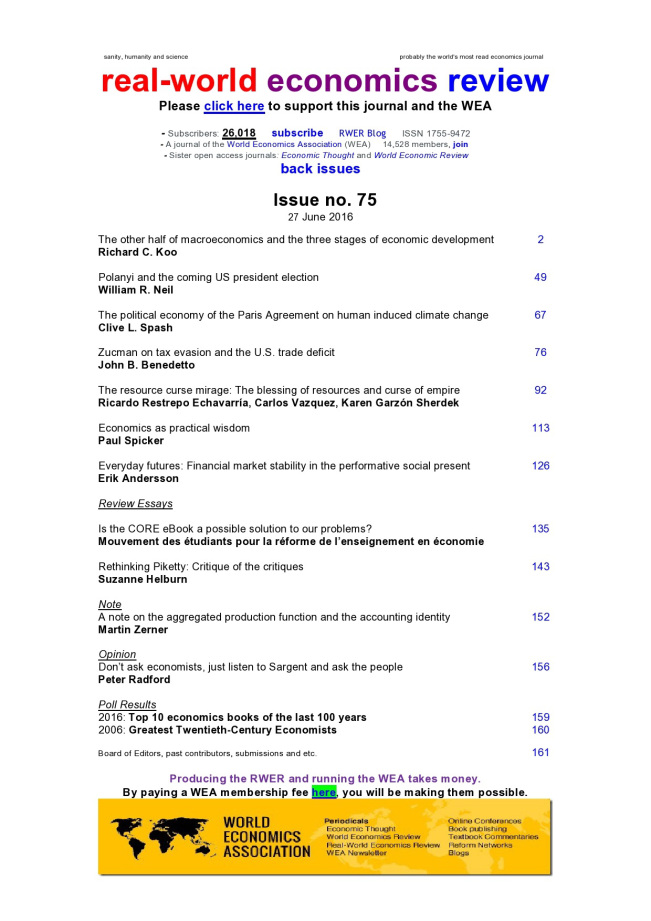Today’s Neoliberalism had nearly silenced serious left dissent by the late 1990s, or successfully isolated it in remote academic corners. Bill Clinton’s two terms in the 1990s are proof of that. And there is the continuing tension between Neoliberal economics and democracy: notice the desperate, barely concealed attempt by the Republican Right to shrink the franchise, using as one of its main levers the racial stigmas from “The Great Incarceration” and the yet to be proven accusations of voter fraud. This political “shunning” of the left happens even in the supposedly liberal Ivy League. The late political theorist Sheldon Wolin (1922-2015), shortly before his death, in an interview with Chris Hedges, spoke of the silent treatment he was given by the faculty at Princeton University when he placed a copy of his new magazine “Democracy” on the faculty lounge coffee table. He was shunned. Perhaps they did not like where he was going with his last book, or could see it coming much earlier: Democracy Inc.: Managed Democracy and the Specter of Inverted Totalitarianism (2008). Here is that interview, Segment Seven from a nine part series at the RealNewsNetwork.
Topics:
Editor considers the following as important: Uncategorized
This could be interesting, too:
tom writes The Ukraine war and Europe’s deepening march of folly
Stavros Mavroudeas writes CfP of Marxist Macroeconomic Modelling workgroup – 18th WAPE Forum, Istanbul August 6-8, 2025
Lars Pålsson Syll writes The pretence-of-knowledge syndrome
Dean Baker writes Crypto and Donald Trump’s strategic baseball card reserve
Today’s Neoliberalism had nearly silenced serious left dissent by the late 1990s, or successfully isolated it in remote academic corners. Bill Clinton’s two terms in the 1990s are proof of that. And there is the continuing tension between Neoliberal economics and democracy: notice the desperate, barely concealed attempt by the Republican Right to shrink the franchise, using as one of its main levers the racial stigmas from “The Great Incarceration” and the yet to be proven accusations of voter fraud.
This political “shunning” of the left happens even in the supposedly liberal Ivy League. The late political theorist Sheldon Wolin (1922-2015), shortly before his death, in an interview with Chris Hedges, spoke of the silent treatment he was given by the faculty at Princeton University when he placed a copy of his new magazine “Democracy” on the faculty lounge coffee table. He was shunned. Perhaps they did not like where he was going with his last book, or could see it coming much earlier: Democracy Inc.: Managed Democracy and the Specter of Inverted Totalitarianism (2008). Here is that interview, Segment Seven from a nine part series at the RealNewsNetwork.
Modern economic thought, and practice, since the 1970s, has witnessed a growing crescendo of Market Utopianism – the “purer the better” – is still the rallying cry of the Republican Right, even in the wake of the sobering events of 2008-2009 and despite some professional economists making substantial dents in the pretentions. And if you had any doubts about that, then you haven’t been watching the Republican Presidential Primary debates of 2015-2016, or the sheer destructive obstructionism of its behavior towards President Obama as shamefully displayed in Congress. In its deliberate jamming of the democratic process itself, the Republican Right echoes the behavior if not the ideas of the Fascist parties in the Parliaments of Italy and Germany in the 1920s and early 1930s, before they became outright dictatorships.
Republican words do not mock the democratic process itself, but that is their effect, and it is clear that the intent is to de-legitimize the fairly elected President of the United States. Therefore it is very important for American readers to be clear about where Karl Polanyi thought the original Market Utopianism of the early 19th century would lead, and the connections he drew between the origins of classical economics and the collapse of the “long” 19th century in the 1930s: “In order to comprehend German fascism, we must revert to Ricardian England.”
Polanyi was far more broadly educated than most economists, perhaps an equal to Keynes. He was employed in Vienna in the 1920s as the “senior editor for the premier economic and financial weekly of Central Europe”– the Financial Times of its day and region. On the very first page of the opening chapter of The Great Transformation, Polanyi delivers his judgement on where the logic of mandating free markets as the dominant force in society would lead if not tempered with countervailing power:
Our thesis is that the idea of a self-adjusting market implied a stark utopia. Such an institution could not exist for any length of time without annihilating the human and natural substance of society; it would have physically destroyed man and transformed his surroundings into a wilderness. Inevitably, society took measures to protect itself, but whatever measures it took impaired the self-regulation of the market, disorganized industrial life, and thus endangered society in yet another way. It was this dilemma which forced the development of the market system into a definite groove and finally disrupted the social organization based upon it.
That dilemma, the struggle over the nature of allowable interventions into the private market system to cope with its seemingly inevitable imbalances, gyrations, recessions and depressions, is still with us. There were prominent claims, however, in the late 1990s, that recessions were gone forever, the perpetual growth machine having been overseen by Alan Greenspan, and he was confident that the new financial derivatives would spread the risk to those who could best bear it. Greenspan was one of the members of Bill Clinton’s “Committee to Save the World” along with Robert Rubin and Larry Summers. During that time they were Utopians and would be Prometheans.

